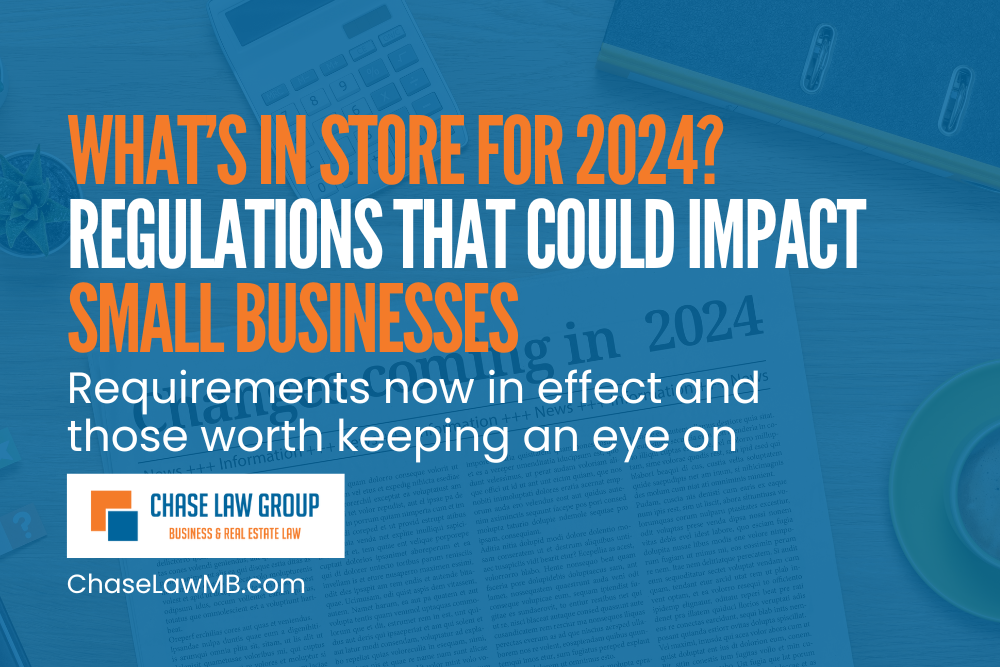What’s in store for 2024? Regulations That Could Impact Small Businesses
By Admin January 29, 2024 Category: Compliance Tags: 2024 Biz Rules Business Regulations 2024 Business Transparency CFPB Compliance chase law manhattan beach Corporate Transparency Act deanne chase employment attorney employment law Entrepreneurial Compliance FinCEN Registration IRS Reporting los angeles attorney Regulatory Changes Small Business Compliance small business law

As we step into 2024, small businesses may face evolving regulations. From the Corporate Transparency Act to the nuanced IRS reporting rules and the watchful eye of the Consumer Financial Protection Bureau (CFPB), business owners must be aware of these areas. In this article, we share a few key regulatory changes to keep an eye on for 2024. Stay informed, stay compliant, and stay ahead with these insights.
Corporate Transparency Act & Registering with FinCEN
Starting on January 1 2024, your company may be required to report information about the people who own or control it to the US Treasury Department’s Financial Crimes Enforcement Network (FinCEN). FinCEN promotes national security and protects the US financial system from fraud and abuse by criminals and corrupt officials.
In 2021, Congress passed the Corporate Transparency Act which creates a new requirement for many companies formed or operating in the US to report their Beneficial Ownership Information (BOI) to FinCEN. This reporting requirement aims to enhance transparency and accountability within corporate structures, contributing to a more secure and transparent financial environment in the United States.
To help you understand what your requirements may be under the new law, we’ve compiled a set of commonly asked questions from resources published through the US Treasury Department to highlight some of the key points of this reporting requirement. Read the article here.
IRS Delays Reporting Rules For Digital Transactions via Apps Like Venmo and Zelle
The Internal Revenue Service announced a delay in the reporting threshold for third-party payment platforms like Venmo and Zelle in 2023, treating this as a transition year after confusion with so many 1099-K forms being issued to taxpayers who may not have a tax obligation. As a result, reporting will not be required unless the taxpayer receives over $20,000 and has more than 200 transactions in 2023. It should be noted that “the IRS is planning for a threshold of $5,000 for tax year 2024 as part of a phase-in to implement the $600 reporting threshold enacted under the American Rescue Plan (ARP).” Please consult with your tax advisor for your particular tax situation.
Small Business Loans and Bank Reporting Requirements
The Consumer Financial Protection Bureau (CFPB) finalized a rule required by Congress to increase transparency in the small business loan process to promote economic development, and combat unlawful discrimination. The CFPB will require lenders and banks to collect and report information about the small business credit applications they receive, including geographic and demographic data, lending decisions, and the price of credit. Due to ongoing litigation, the CFPB has stayed deadlines originally set for compliance under the Small Business Lending Under the Equal Credit Opportunity Act. However, it’s worth monitoring in 2024.
Chase Law Group is here to keep business owners informed and provide essential legal support.
www.chaselawmb.com
Contact us for your employment and business law needs
Please note that this article is for informational purposes only. It is recommended to consult with the proper attorneys, financial and tax advisors for specific guidance pertaining to your business and its practices.

